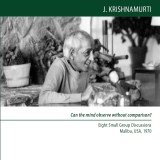Details

Can the mind observe without comparison?
Eight Small Group Discussions, Malibu, USA, 1970|
14,99 € |
|
| Verlag: | Krishnamurti Foundation Trust UK |
| Format: | MP3 (in ZIP-Archiv) |
| Veröffentl.: | 01.01.2018 |
| ISBN/EAN: | 9781912875573 |
| Sprache: | englisch |
Dieses Hörbuch erhalten Sie ohne Kopierschutz.
Beschreibungen
1. Living with a sustained seriousness - 21February 1970 Duration: 91 minutes • What does it mean to be serious? • Becoming • Why do I compare myself with you or with somebody else? • Do I look at people through images? 2. Can the brain operate without recourse to the past?- 22February 1970 Duration: 92 minutes • Is there self-progress? • Conflict • Security • Any form of division within oneself is a source of conflict. • Can the brain be quiet? 3. What makes one control? - 14March 1970 Duration: 97 minutes • Violence • Why do you control? • Security means to be in a state in which there is no choice at all. • The mind has become sensitive because it has observed, not because it has experienced. • Either you see the fact with the past or you see the fact as it is now. • The word is of the past. 4. Being serious without belief - 15March 1970 Duration: 77 minutes • Can the intellect, a fragment, ever be serious? Serious in the sense of a sustained observation without any distortion. • Control • What is living? • How does it happen that one can be completely harmonious? • What does awareness mean? 5. Attention leads to learning - 21March 1970 Duration: 93 minutes • Inattention and attention. • Observing without the word. • What is the function of sleep? • Is love a matter of culture, a thing of pleasure and therefore dependency? 6. Fear in consciousness - 22March 1970 Duration: 89 minutes • How does it happen that the deep layers hidden in consciousness can be exposed? • Comparison between what is with what has been and what will be, is the process of fear. • Can the mind observe without comparison? 7. What is order?- 28March 1970 Duration: 81 minutes • Order and disorder. • Why does the mind accumulate? • How do you receive something that is not of the mind? 8. How is one to be entirely free of fear?- 29March 1970 Duration: 90 minutes • Fear • All the escaping and the strengthening of fear comes because we are inattentive. • What is sleep?
J. KRISHNAMURTI Jiddu Krishnamurti (May 12, 1895–February 17, 1986) was a world renowned writer and speaker on philosophical and spiritual subjects. His subject matter included: the purpose of meditation, human relationships, the nature of the mind, and how to enact positive change in global society. Krishnamurti was born into a Telugu Brahmin family in what was then colonial India. In early adolescence, he had a chance encounter with prominent occultist and high-ranking theosophist C.W. Leadbeater in the grounds of the Theosophical Society headquarters at Adyar in Madras (now Chennai). He was subsequently raised under the tutelage of Annie Besant and C.W. Leadbeater, leaders of the Society at the time, who believed him to be a "vehicle" for an expected World Teacher. As a young man, he disavowed this idea and dissolved the world-wide organization (the Order of the Star) established to support it. He claimed allegiance to no nationality, caste, religion, or philosophy, and spent the rest of his life traveling the world as an individual speaker, speaking to large and small groups, as well as with interested individuals. He authored a number of books, among them The First and Last Freedom, The Only Revolution, and Krishnamurti's Notebook. :" In addition, a large collection of his talks and discussions have been published. At age 90, he addressed the United Nations on the subject of peace and awareness, and was awarded the 1984 UN Peace Medal. His last public talk was in Madras, India, in January 1986, a month before his death at home in Ojai, California. His supporters, working through several non-profit foundations, oversee a number of independent schools centered on his views on education – in India, England and the United States – and continue to transcribe and distribute many of his thousands of talks, group and individual discussions, and other writings, publishing them in a variety of formats including print, audio, video and digital formats as well as online, in many languages.
Diese Produkte könnten Sie auch interessieren:

Filosofiya Vostoka: s poyasneniyami i kommentariyami. Ot Lao-TSzy i Konfutsiya do kodeksa samuraev "Busido"

von: Sbornik, Stanislav Ivanov

8,99 €















